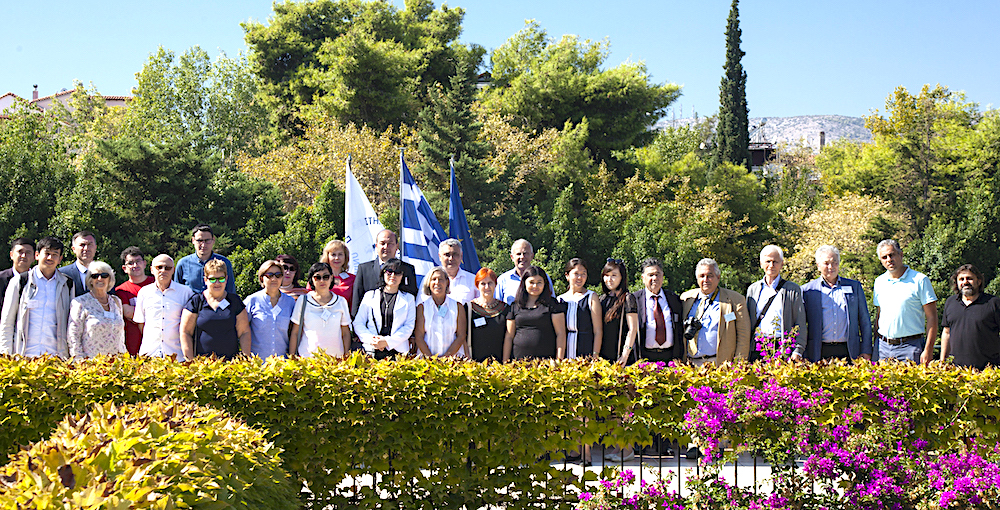 The three-year European Project CLASS (Interdisciplinary Master Program on Computational Linguistics at Central Asian Universities) has been approved under the Erasmus+ CBHE act, with NUMPER 585845-EPP-1-2017-1-ES-EPPKA2-CBHE-JP, having received a grant of 761.450€ and date of start the 15-10-2017.
The three-year European Project CLASS (Interdisciplinary Master Program on Computational Linguistics at Central Asian Universities) has been approved under the Erasmus+ CBHE act, with NUMPER 585845-EPP-1-2017-1-ES-EPPKA2-CBHE-JP, having received a grant of 761.450€ and date of start the 15-10-2017.
The consortium of the program consists of 5 European Universities (University of Santiago de Compostela-USC, Spain, University of A Coruna-UDC, Spain; University of West Attica-UNIWA, Greece; University of Porto-U.PORTO, Portugal; Adam Mickiewicz University-AMU, Poland), 4 Universities of Uzbek (Uurg State University-UrSU, Samarkand State Institute of Foreign Languages-SamSIFL, Tashkend State University of the Uzbek Language and Literature-TSUULL, The National University of Uzbek-NUUz) and 3 Universities of Kazakhstan (A.Baitursynov Kostanay State University-KSU, L.Gumilev Eurasian National University-ENU, Al-Farabi Kazakh National University-KazNU). Coordinator of the program is the University of Santiago de Compostela. Local Coordinator for UniWA, is Katerina Georgouli, professor at the Department of Informatics and Computer Engineering of the School of Engineering.
The aim of the program is to develop Kazakh and Uzbek universities’ capabilities to enhance access to higher education offering blended learning master programs in computational linguistics for students with linguistics and computational science background. To achieve this aim, a strong collaboration between scientists in the field of linguistics and computational technology, both from EU Universities and Central Asia (CA) Universities was established and maintained during the program. The specialists shared their expertise for the benefits of master students and society, seeking for efficient ways of intercultural dialogue and thus easier integration into world economy. The result of the effort under the CLASS program is the development of new postgraduate programs in the field of Computational Linguistics at CA Universities, with modern course outlines as well as material for blended learning.
During the three years of the program, meetings have been held between all the partners both for the development of cooperation between them and for the education of the professors of the CA Universities who would teach in the new postgraduate programs. Specifically, in February 2018 the kick-off meeting of the program took place at the University of Santiago de Compostela where, the Steering Committee had been defined and the program action plan was defined and approved by all partners. Later, in the summer of 2018, a 12-day blended learning programme was organised at the University of A Coruña with 34 professors and staff from the CA Universities. In November of the same year, the partners met again in Tashkent, where, among other things, an assessment of what had been done up to then and the approval of the action plan for the next year took place. In May 2019, at Adam Mickiewicz University, the next training of the academic staff of the CA Universities in the methodologies and strategies for the development of Natural Language Processing Tools (NLP tools) was organised. Finally, in September 2019 the annual meeting of the Steering Committee was held in Athens, on Campus 1 of the UniWA, where the evaluation of the program and the progress of the different packages that were under development such us the development of NLP tools and the blended learning materials were discussed. In 2020, due to the COVID-19 pandemic, the planned live meetings did not take place, but the program continued normally with the remote support of EU partners to their CA colleagues for the smooth production of program deliverables. Also, due to the pandemic, the teaching material of the postgraduate programmes have been adapted, as the courses at the CA Universities of Central Asia are now taught remotely.
The programme ends at 14/4/2021, after a six-month extension due to COVID-19, and we hope that the established cooperation between the partners will continue, particularly in Central Asian countries.












